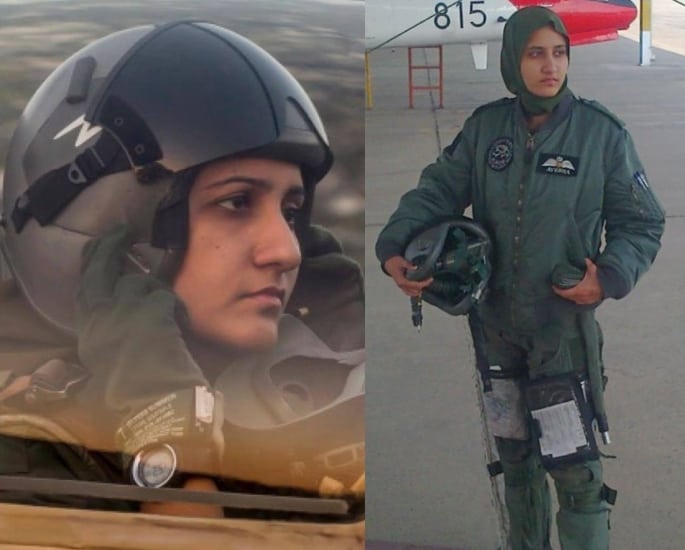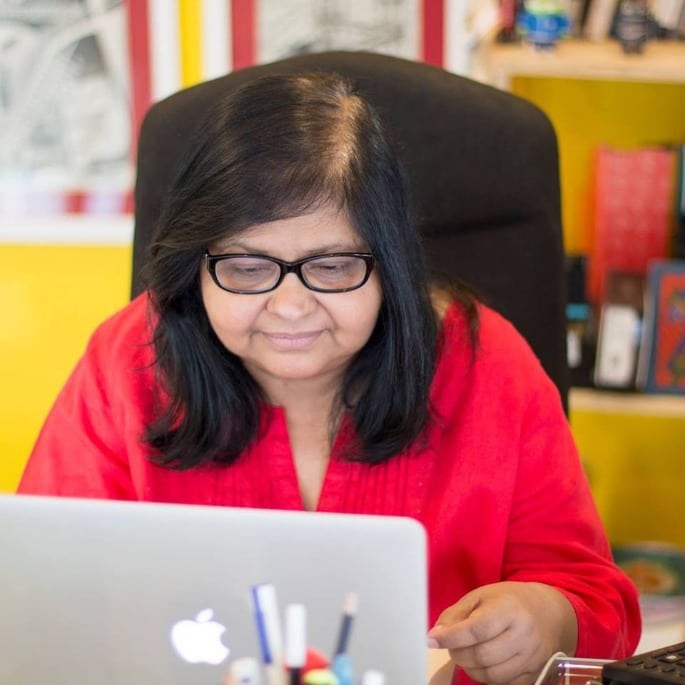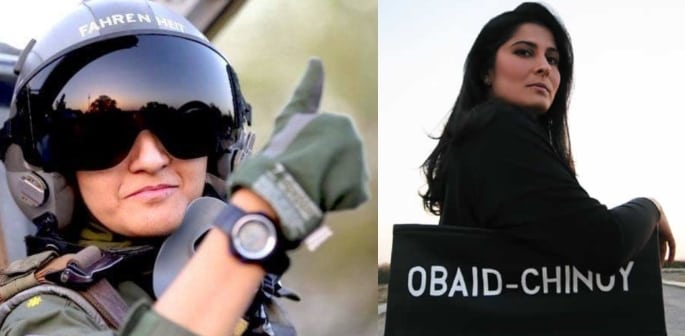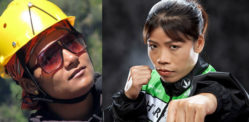"my entire climbing purpose was to empower women through these adventures"
Pakistan’s women are known for being strong, intelligent and incredibly resilient human beings.
Despite the conservatism of their surroundings, many have had the opportunity to truly exert their talents across many different fields.
Doing so, they have influenced a whole generation of Desi women to stand up and fight for justice against inequality.
In honour of their determination and bravery, DESIblitz reflects on 11 strong women of Pakistan, past and present, who have truly inspired us.
Malala Yousafzai

“I speak not for myself but for those without voice… those who have fought for their rights… their right to live in peace, their right to be treated with dignity, their right to equality of opportunity, their right to be educated.”
Perhaps one of the most famous young Pakistanis of the millennial generation is Malala Yousafzai.
Known for standing defiantly in the destructive and hate-strewn path of her oppressors, Malala is a great advocate of education, particularly in parts of the world where girls are not allowed to even go to school.
Born on 12 July 1997 in Mingora, Pakistan, Malala was instilled with the importance of knowledge and learning from a very early age by her parents.
Her eagerness to learn was not dampened when the Taliban banned girls from going to school.
At the age of 11, she began blogging for the BBC about her life under this repressive rule. As she gained more prominence about women’s rights, she began to receive death threats. At the age of 15, she was shot in the head for her activism.
Having survived the attack, Malala now lives in the UK where she regularly fights for women’s causes around the world. Setting up the Malala Fund, she champions for every girl’s right to 12 years of free, safe, quality education.
In 2014, she became the youngest-ever Nobel Laureate, winning the Nobel Peace Prize alongside Indian activist Kailash Satyarthi.
Currently studying at the University of Oxford, Malala is an example of the unwavering determination of women in the face of misogynistic attitudes.
Sharmeen Obaid-Chinoy

Two-time Oscar-winning filmmaker, Sharmeen Obaid-Chinoy has long been a supporter of women empowerment.
Her powerful short films have done much to counter social and cultural taboos that mostly incriminate rural women across Pakistan.
Born in Karachi, Sharmeen travelled to the USA where she studied journalism. It was here that a passion for documentaries and filmmaking began to develop.
Chinoy became particularly interested in highlighting some of the deeper issues that lay in the fabric of Pakistani society, including refugees, acid attacks and honour killings.
In 2012, she won an Academy Award for her documentary, Saving Face. The film followed a Pakistani plastic-surgeon as he performed reconstructive surgery on the survivors of acid attacks.
She won yet another Academy Award, for her 2015 short film, A Girl in the River: The Price of Forgiveness. It recalls the real-life story of a 19-year-old girl, Saba, who escaped an honour killing by her father and uncle after she fell in love with a boy of her own choosing.
Through her on-the-ground style of story-telling, Sharmeen has opened up debates about the status of women in Pakistan. Sadly, she has faced much censure for her efforts. Speaking to The Guardian, Sharmeen admitted: “I am a woman. I am successful. And I am not afraid to speak my mind. And that doesn’t sit well with a lot of men – and women.
“It is very hard to be a woman in Pakistan and speak your mind. You know there will be an attempt to silence you. And the more people do that with me, the more I know I am being successful.”
Ayesha Farooq

Bahawalpur-born Ayesha Farooq is one of the first women to become a fighter pilot in the Pakistan Air Force.
Farooq admits that she has always been the breadwinner of the family, particularly after her father, who was a doctor, passed away when she was only three years old. In a media interview, she says: “I was always the man of my family.”
Speaking at the Aga Khan University (AKU) in Karachi, Ayesha adds that it was her mother’s influence that taught her the skills to take care of herself and help others:
“My mother raised me to be strong, to a point that if one day, I was left alone, I would be able to take care of myself.”
Her steely determination to do the right thing and support her mother and sisters seem to have naturally progressed into a career as a fighter pilot. While she understands the job is not seen as one open to women, she is happy to have been welcomed as an equal by her male colleagues:
“It’s not a job that people here associate with ladies, so as well as doing a job for my country, I’m changing the thoughts of people. It’s a big responsibility but one I enjoy.”
“I don’t feel any different. We do the same activities, the same precision bombing,” she tells Reuters.
Interestingly, the Air Force is seeing a surge of female fighter pilots joining, showing how the once male-dominated army is now becoming more accessible to women. And Farooq has become a bold and strong role model for other young girls.
Muniba Mazari

In 2007, 21-year-old Muniba Mazari was struck by tragedy when a car crash left her paralysed from the hip down.
Unable to walk again or give birth, Muniba’s optimism saw her emerge as a talented artist and model. 10 years later and the courageous Pakistani woman is now a motivational speaker, activist and the National Ambassador for UN Women Pakistan.
Delivering a TED Talk, Muniba describes how despite her tragic circumstances, she has been able to carve out a positive future for herself. Notably, she calls out the stigma of disability in Pakistani society, where many are forced to stay indoors and away from the public eye:
“They call it adversity, I call it opportunity. They call it weakness, I call it strength. They call me disabled, I call myself differently abled. They see my disability, I see my ability.”
“There are some incidents that happen in your life and those incidents are so strong that they change your DNA. They break you physically, they deform your body, but they transform your soul. They mould you into the best version of you and the same thing happened to me.”
While Muniba ended up bed-bound for two years and before eventually moving to a wheelchair, she decided to become a public figure that can help and inspire others.
After divorcing her husband, she adopted a child and now regularly appears on TV as an anchor. She is widely known as the ‘Iron Lady of Pakistan’.
Asma Jahangir

A prominent Pakistani human rights lawyer, the late Asma Jahangir spent much of her career on a socio-political battleground campaigning for the rights of marginalised communities.
As a social activist, she was vehemently outspoken and brutally honest, making her a target for online trolls and offline quibblers around the country.
While she fought for minorities, labourers and women’s rights, some of her more controversial acts came in her criticism of military interference in politics and being a champion of those charged under blasphemy laws.
She brought Pakistan’s attention to the plight of those in Kashmir, Syria and Rohingya, and dedicated herself to those causes that lay on her doorstep.
Interestingly, while broader current affairs continue to be a constant debate amongst politicians and economists, Asma was keen on giving a voice to those without one. And by peering into inner Pakistani society, she was able to uncover the darkness that lay there. She once said:
“I think it sounds very hollow if I keep talking about the rights of Kashmiris, but do not talk about the rights of a woman in Lahore who is battered to death.”
Her numerous clashes with the authorities led her to be put under house arrest. Despite her life-long struggle against those who would silence her, Asma was widely seen by the West as ‘Pakistan’s social conscious’ – an eternally burning reminder of society’s failings.
Asma’s list of achievements is seemingly endless. She co-founded the Human Rights Commission of Pakistan (HRCP) in 1987, as well as the Women’s Action Forum. She was also the first woman president of the Supreme Court Bar Association.
In February 2018, Asma passed away after suffering a cardiac arrest. Her legacy to bring equality and justice to Pakistan’s citizens has not been forgotten, and she has inspired a whole legion of activists across the nation to continue her work.
Abida Parveen

Abida Parveen is truly an underrated superstar of Pakistan’s music industry. The Pakistani Queen of Sufi music, Abida’s incredible talent has led to her achieving a global following, with musicians and music fans around the world lauding her achievements.
What makes the artist stand out from her contemporaries is her unwavering focus on her craft. In an interview with The Guardian, Abida reveals that her passion for Sufism is not just confined to music, but her entire lifestyle:
“Sufism is not a switch, the music isn’t a show – it’s all of life, it is religion. If I want to be recognised for anything, if we should be recognised for anything, it’s the journey of the voice. And that voice is God’s.”
Abida was introduced to music by her father, who was also a prominent Sufi musician. Born into this legacy of mystics, Parveen began singing at the age of three.
Noting his daughter’s talent, Abida’s father decided to forgo cultural gender expectations and train his daughter in the art of music instead of his sons.
Parveen frequently recalls in her interviews how they would perform at Sufi shrines or Dargas for hours at a time.
For Abida, gender is very much a fluid concept, and her talent seems to have overshone any inequality that may come from being a woman living in Pakistan.
Indeed, she is placed on the same pedestal as other prominent artists such as Ustad Nusrat Fateh Ali Khan or Mehdi Hassan. Once she arrives on the stage, audiences will find themselves mesmerised:
“The concept of being a man or a woman doesn’t cross my mind. I’m neither on stage, I’m a vehicle on stage for passion,” she tells The Guardian.
Maria Toorpakai

Maria is a true example of the lengths that some women have to take to realise dreams that are otherwise denied to them.
Ranked as one of Pakistan’s top squash players, Maria’s route into sport came from disguising herself as a boy. As she mentions on her website:
“I was born in Waziristan, Pakistan, a remote region commonly referred to as the “most dangerous place on earth. Girls rarely go to school and certainly don’t place sports. But, I grew up differently from other girls. At the age of four, I burnt all her [sic] dresses, cut my hair, put on my brother’s clothes and began to live life as a boy.”
“My father, a strong advocate for equal rights and opportunities for men and women, pushed tradition aside and allowed me to live disguised in order to flourish as an athlete.”
Maria’s father decided to enrol her in a weightlifting class in 2002, giving her the name of ‘Changez Khan’ (or Genghis Khan) as a disguise. Dressing as a boy, Maria was able to fit in with sport quite comfortably and was ranked in the number 2 spot in all of Pakistan for weightlifting in the junior division.
It was at this point that Maria discovered squash after seeing it being played, and her father decided to enrol her in the local academy:
“When the local squash academy in Peshawar required a birth certificate, my true identity was revealed. Fortunately, the director shared the same values as my father and handed me a racquet.”
She turned professional in 2006. However, as news of her real gender became more and more known, she and her family began to face threats. Maria was forced to stay at home for several years and would practice squash against a wall in her house.
Realising that it was no longer safe for her to stay there, Maria began sending emails and letters to schools and players around the world. In 2011, she was invited by former squash player Jonathan Power to train at his academy in Toronto, Canada.
Maria Toorpakai has since returned to Pakistan after competing in a number of championships abroad. While she cannot play in Pakistan, she hopes to inspire other girls to realise their dreams.
Fatima Jinnah

It would not be wrong to assume that the tenacity and strength of the Mother of the Nation inspired the generations of Pakistani women that followed her.
Sister of Pakistan’s founder, Muhammad Ali Jinnah, Fatima Jinnah is regarded as one of the instrumental figures in securing the rights of women across Pakistan.
As a steadfast supporter of her brother and his vision for a new nation, Fatima was a visible figurehead in the colonial man’s world.
She established the Women’s Relief Committee soon after Pakistan’s creation in 1947, which later transformed into the All Pakistan Women Association, run by Rana Liaquat Ali Khan. The organisation was vital for the settlement of women in the new country, as well as promoting their civil rights.
Paying tribute to her sister, the Quaid once said:
“My sister was like a bright ray of light and hope whenever I came back home and met her. Anxieties would have been much greater and my health much worse, but for the restraint imposed by her.”
After her brother’s passing, Fatima became a key voice in political discourse, remaining a constant reminder of her brother’s intentions for the nation when new governments followed. Her directness was not always appreciated, however, and she faced much opposition when she voiced her disdain at the direction the country was going in.
She found herself heavily censored during radio broadcasts and the like. Even her book, My Brother, written in 1955 was censored and published 32 years later.
In 1965, she ran in the elections while in her seventies, in an attempt to counter Ayub Khan’s military dictatorship. As a pioneer of Pakistani female empowerment, she gave way to a whole generation of free-thinking women to stand up for their own rights.
She famously said: “Remember it is women who can mould the character of the youth of the nation.”
Samina Baig

Samina is a high-altitude mountaineer who became the first Pakistani woman to climb all seven of the highest peaks around the world.
She did so in the space of eight months, aged only 23.
The seven summits include:
- Mount Everest in Asia
- Mount McKinley in Alaska
- Mount Elbrus in Russia
- Carstensz Pyramid in Indonesia
- Mount Kilimanjaro in Tanzania
- Mount Vinson in Antarctica
- Mount Aconcagua in Argentina
Hailing from one of the most northern areas of Pakistan, Samina’s interest in outdoor climbing and mountaineering had been instilled from an early age. She was aided by her brother Mirza Ali who is also a mountaineer.
Having achieved such a great feat, a documentary was created on Samina’s powerful journey to Mount Everest called Beyond the Heights.
It showed the sense of achievement that Samina felt as she trekked to the top, being the first Pakistani woman to do so.
Early in 2018, Samina was also named Pakistan’s National Goodwill Ambassador by UNDP. On achieving this great honour, Samina said:
“From the remotest village of Pakistan and reaching the summit of the world’s tallest mountain, Mt. Everest and beyond the borders, Scaling Peak in Antarctica and the seven highest peaks of the seven continents, in some of the most harsh conditions, my entire climbing purpose was to empower women through these adventures and encourage gender equality.
“With my brother, I have experienced significant impact of global warming and climate change on our mother earth.
“I find this honour as the national goodwill Ambassador of UNDP to spread the voice for climate change and environmental protection and advocate to empower young girls to climb the highest level within their field of profession.”
Maria Umar

With the rise of digital dependency around the world, Maria Umar is one of the many women in Pakistan who is overcoming gender stereotypes by empowering women to work online.
‘The Women’s Digital League’ is the brainchild of Umar and is an online platform that offers digital training and job opportunities for Pakistani women.
In particular, it offers a way for women to work while still at home – something that remains an issue in parts of the country where families discourage women to leave the home in pursuit of work. The idea stemmed from Maria’s own experiences.
In an interview with Dawn, Maria explains:
“I came from a really conservative background and I was not allowed to go out without a male chaperone. I wanted to work but the opportunities were few.”
“I started teaching at a school but they fired me after three years when I became pregnant.
“I didn’t know what to do, so I started looking online because I knew my family was not going to allow me to pursue any other profession. I thought nobody would object to online work, but once I started giving shape to WDL, it just grew and my family saw the commitment I had to my work.”
Umar’s initiative brings work to the women, who can join the digital outsourcing company and work as freelancers.
In another interview with Mashable, Maria says: “Girls themselves are becoming more empowered and asking for their right to [education].
“Unfortunately not very many actually utilise that education in the formal sector… Families discourage girls from working outside due to [the] security situation and lack of social acceptance.”
She is applauded for being one of the key leaders in promoting entrepreneurship in Pakistan, by giving women the freedom to work on their own terms.
Jehan Ara

Jehan Ara is a well-known name in Pakistan’s technology industry. She is the President one of the largest tech associations in the country called P@SHA.
Alongside this, she is a strong supporter of startups and entrepreneurship. Her organisation is closely linked to a number of outreach programmes and initiatives with the aim to support tech-based startups.
One of the key incubators that the organisation runs is called the NEST I/O. Speaking to Tech In Asia, Ara says: “We noticed a lot of young, dedicated, and talented individuals with futuristic ideas.”
Notably, Ara is also a prominent advocate for cyber freedom and net neutrality.
In their own unique ways, these women have fought valiantly to overcome cultural and misogynist barriers.
By no means is this list definitive, Pakistan is seeing a rise in the number of women who are actively seeking change and equality across all sectors.
But, being both strong and capable, these women of Pakistan are examples of the fitting role models for future generations of girls, women and men as well.
In a society that encourages women to sit down and stay quiet, they have become the leaders of tomorrow, and they deserve our adoration.






























































